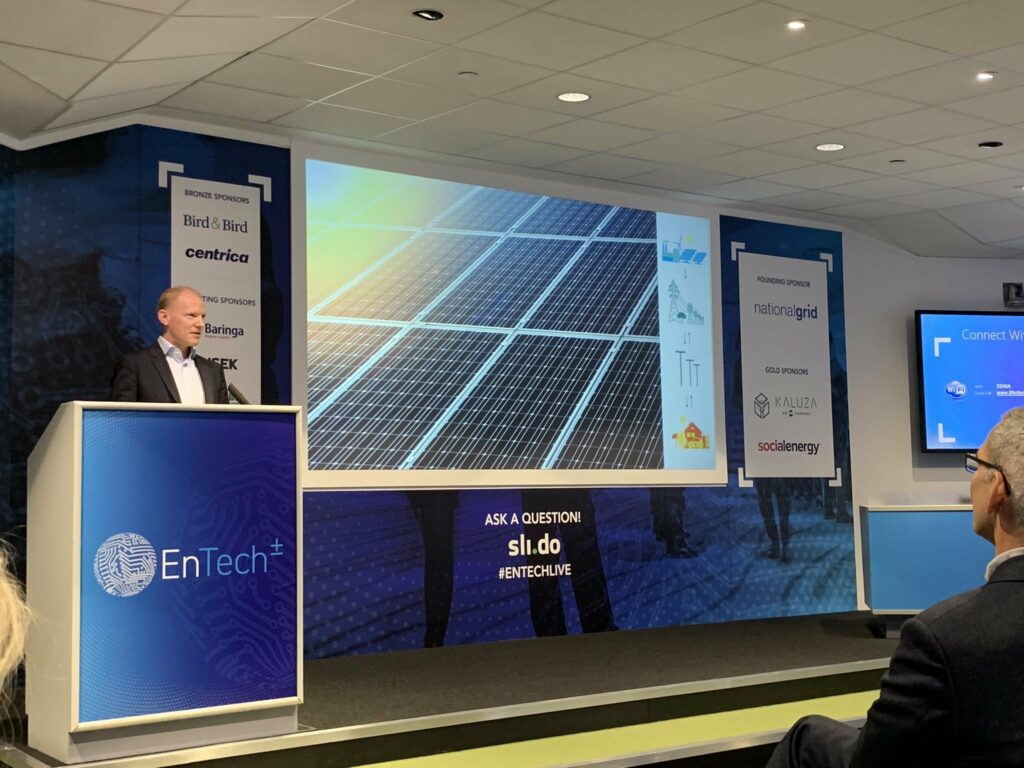Current±’s editorial reflects on the inaugural EnTech Conference in London, unpicking five of the key takeaways from the two-day event.
Energy companies are not taking enough risks
Day one kicked off with an interesting talk from former technologist Ade McCormack who, taking in lessons learned from other industries, discussed how companies in the energy sector are too risk averse to affect real change.
This cannot continue if the UK is to stand any chance of meeting its net zero target, and energy companies will have to adapt their strategies and internal politics to take more chances when it comes to investing in emerging technologies and business models.
Instead, energy companies must now begin to look at themselves as a “portfolio of experiments” where, inevitably some might not work or fall at the first hurdle, but others could well flourish.
McCormack pointed in particular to Silicon Valley, where much of the world’s novel technologies and business models originate, an area “predicated by risk”, McCormack said, adding that “with risk comes value”.
While this may not be music to the ears of energy company board rooms and financial directors across the world, they must take direction from the fact that the alternative – to stand still or move at the same glacial pace – will simply see others overtake them.
The need for consumer engagement remains
Mentioned throughout many of the talks at EnTech was the continued need to engage and educate consumers. Efforts to do such have been around for years, yet half of consumers remain unengaged, and have never even switched suppliers, let alone engaged in real, tangible behavioural change.
This creates a number of problems, not least meaning opportunities to develop flexibility are missed as they are simply not considered. This was the conclusion of the ‘Using Electricity Intelligently’ panel, who found that DSR opportunities were being lost because consumers simply don’t know the flexibility that they “sit on”.
To try and improve the situation, the Renewable Energy Association is developing consumer profiles, to help the industry tailor engagement, and develop understanding.
‘Data science is an enabler of an enabler,’ not just a buzzword
Scepticism has arose around many concepts in the energy sector, as they have become buzzwords for presentations but failed to deliver their original potential.
However, Danae Marshall, head of delivery – smart energy data at BEIS warned against allowing such a trend to tarnish data science. Instead she said that it was “an enabler of an enabler”, as it can be used to effectively transition the energy sector to be carbon neutral and therefore help mitigate climate change.
Her views were mirrored throughout the ‘Data Driving Change’ panel on which she spoke. We’ve seen an explosion of data, but there is still much more to come they said, as people learn how to true utilise it.
The energy industry is no longer able to work in siloes
As the industry faces a myriad of transitions – decarbonisation, DNOs to DSOs and decentralisation to name but a few – it will have to take learnings from and follow in the footsteps of industries that have gone before it.
This was a key takeaway of several panels at the conference, with many speakers agreeing on the need to collaborate with and learn from other industries that have seen a digital revolution in particular. Banking was cited on several occasions as a sector to learn from, especially in terms of open data.
David Sykes, senior data scientist at Octopus Energy, said that “following other sectors in how they’ve done stuff will drive down the cost” of digitalisation.
And within the industry, there must be more collaboration between different players, with Graham Campbell, head of DSO at SP Energy Networks saying that for him, the “key to opening the door” is collaboration across the entire value chain.
Open data is going to be key
There was a significant amount of approval from speakers at the conference for the Energy Data Taskforce’s recommendations of open data, with BEIS’ Danae Marshall describing digitalisation and open data as “essential for whatever products come next”, although debate over what data should be open remained rife during the panel session Marshall sat on – and the answer uncertain.
Having data readily available, however, could result in a more level playing field that would enable more innovation, it was agreed upon. Ronald Hendrikx, partner at Bird & Bird, said that once open data is available, the industry will see “a second explosion of creativity from people who are starting to solve problems”, which will be “more exciting” than the data itself.
However, it was agreed by many at the event that we are only at the tip of the iceberg when it comes to data and that there is still much more to come as the industry becomes increasingly digitalised.






